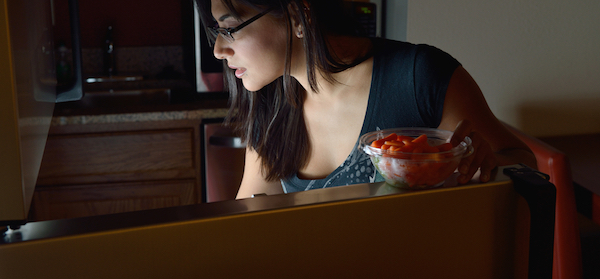It’s not just a lack of willpower with food that makes it difficult to lose weight, it’s also those pesky bad habits we have developed – sometimes without even realising. Here are five of the most common bad eating habits and how to break them.
Bedtime snacking
It’s a long-held belief that eating at night is never a good idea, especially if you want to avoid weight gain. The truth, however, is that it doesn’t matter so much when you eat, as what you eat before bedtime. The recommended daily calorie intake differs from person to person, and is based on age, gender, height and activity.
Theoretically, in terms of weight gain, it shouldn’t matter when you eat, as long as you don’t go over your recommended calorie intake for the day. That said, when it comes to your final meal, it’s best not to overload your body with energy, as this can make for a disrupted night’s sleep. It’s best to make dinner your smallest meal of the day and not consist of anything too rich or too heavy.
Tip: If you must snack before bedtime, go for something light, such as plain popcorn, almonds and plain yoghurt.
Chowing down too fast
In a recent study conducted by food psychologists at Cornell University, it was found that the larger the plate or bowl from which you eat, the more you unwittingly consume. Mindful eating is the best way to practice portion control – it’s also better for your body’s metabolism.
If you tend to chow down too fast on your meals and snacks, you don’t give your brain time to register the food intake. It takes about 15 to 20 minutes for your brain catch up with your stomach and realise that you’re full, so if you’re wolfing down your food, you run the risk of overeating.
Tip: Take your time when eating meals and snacks and focus on taking smaller bites and chewing properly. Try to eat from a plate, sitting down at a table and limit any distractions that may cause you to no to give your food the full attention it deserves.
Shopping while hungry
We all make this classic mistake. Going to the supermarket on an empty stomach is a sure-fire way to end up with a pantry full of naughty snacks. Studies have shown that people who go shopping while hungry are more likely to make bad food decisions.
Tip: Try to make sure that you’ve had something healthy to eat before hitting the supermarket, and if you’re prone to tossing the occasional chocolate bar into the trolley, try instead to hit the health food aisle for something a little less processed.
Deprivation diets
Not eating enough, with a view to shed fat, is perhaps one of the most pervasive weight-loss myths going around. In fact, denying yourself sustenance, especially when you’re hungry, can actually lead to your body retaining fat rather than losing it. When you fast or under eat for long periods, the body panics and switches to energy-conservation mode, meaning your metabolism slows down. When you don’t eat, your blood sugar levels drop and this can account for you feeling tired and cranky when hungry.
Tip: The simple advice here is to eat when you’re hungry – just be sure to eat fresh, whole foods.
Mindless drinking
Absently sipping on lattes or fruit juice during the day might seem like an innocent way to satisfy your brain’s desire to keep consuming, but these drinks can actually contain more calories than some foods. Did you know that some fruit juices and flavoured yoghurts can contain the same amount of sugar as soft drinks? Added to this, when you drink concentrated fruit juice, you end up consuming all the calories and gain very little in the way of the nutritional benefit that you would have received if you’d simply eaten a piece of fruit. While a cup of black, sugarless coffee contains only a handful of calories, if you take your 2–3 daily cups of java with milk and sugar, the calories can really start to stack up.
Tip:If you enjoy continual sipping during the day, make your choices between water and either black or herbal tea, substituting sugar for honey
Related articles:
Five best healthy eating articles
Foods that will make or break a good night’s sleep

